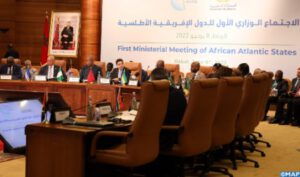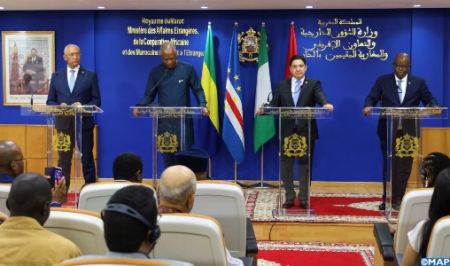Minister Nasser Bourita emphasized that “Atlantic Africa is breaking records in terms of climate vulnerability,” noting that “turning our activities into topics exacerbates environmental problems, with important consequences for food security and displacement, as nearly of the 1.4 million IDPs only in the West African region.”
This came at the conclusion of the first ministerial meeting of African Atlantic countries, which was held yesterday in the Moroccan capital Rabat Declaration.
“Global warming is causing an annual rise in the African Atlantic waters by about 3.6 mm, which directly affects economic activities and coastal life,” Bourita said, noting that the development of a climate early warning system, according to the International Monetary Fund, will reduce the risks of food shortages by 30%. On the continent, especially on the Atlantic coast.
In addition to this are the challenges of human development, economic development, sustainable development and development in general. Atlantic African countries receive only 4% of FDI flows into the Atlantic space, compared to 74% of countries on the northern coast, despite the growing economic potential of Atlantic Africa.
This ministerial meeting, whose work has centered around three themes (“Political and Security Dialogue”, “Blue Economy and Connectivity” and “Environment and Energy”), is an opportunity to develop a common African vision on this vital space, strengthen the transatlantic identity and defend the continent’s strategic interests with one voice. .

After noting that this ministerial meeting is being held in accordance with King Mohammed VI’s vision for South-South cooperation and as part of the interest granted by the King to this Atlantic space conducive to cooperation among African countries, Bourita confirmed that interest in the Atlantic Ocean goes back to the eighties of the last century, on the occasion of the convening of a conference African Ministers of Maritime Fisheries, as well as the Moroccan initiative launched in 2009 to promote the Afro-Atlantic space, has long been beneficial. From a strong will expressed by His Majesty the King and demonstrated by Moroccan diplomacy.
Bourita indicated that Atlantic Africa, which has enormous potential to be exploited, faces great challenges that must be faced by uniting efforts, stressing, in this sense, the need to restructure this geostrategic space.
He also welcomed the “success” of this first ministerial meeting of African Atlantic countries, given the number and level of representation of the participating countries, represented by 15 ministers, i.e. one third of the African Atlantic countries, in addition to achieving tangible results, emphasizing that the level of participation illustrates the importance of this initiative that It was promoted by Morocco and it is also the result of the interest that African countries give to coordination and synergy in this important geo-strategic space.
Referring to the objectives of this meeting, it must be remembered that it is fundamentally about re-establishing cooperation among the African-Atlantic countries and also developing a common vision, as well as collective and coordinated responses to the challenges facing this space and taking into account its potential.
In this sense, Bourita announced that it was decided to form three working groups on security, peace, the blue economy, the environment and its impact on the African Atlantic countries, in addition to reactivating the permanent General Secretariat that operates in a flexible manner, based in Rabat and which coordinates the work of ministerial meetings.
It was also agreed to establish national focal points in order to make the Atlantic Ocean a working space for all ministerial departments and national actors, as informed the Moroccan Minister of Foreign Affairs, adding that work in the next stage will take place within the framework of one team due to the existence of a common identity and because “We are all Africans in the Atlantic”.





